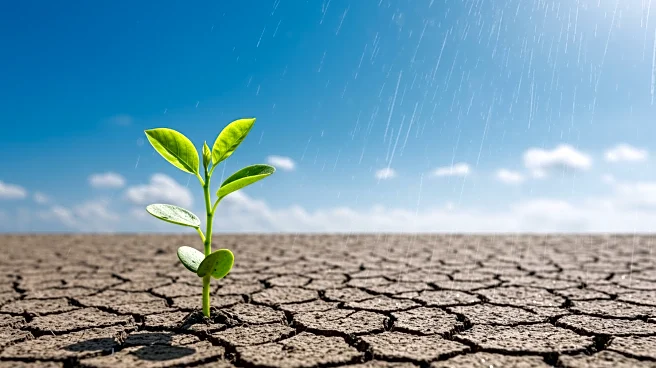What is the story about?
What's Happening?
Namibia's agriculture sector, vital for the livelihood of over 70% of its population, is undergoing significant changes in 2025. The country faces challenges from its arid climate and frequent droughts, but advancements in technology and sustainable practices are paving the way for resilient crop farming. The sector is characterized by extensive livestock farming, with growing momentum in crop farming. Farmers are adopting sustainable agricultural practices and advanced technology, supported by government programs aimed at improving productivity and food security. Key crops include millet, maize, sorghum, groundnuts, and beans, with efforts to diversify and incorporate drought-resistant varieties.
Why It's Important?
The adoption of sustainable farming practices in Namibia is crucial for ensuring food security and economic stability. As climate variability intensifies, these practices help mitigate risks and improve resilience. The focus on drought-tolerant crops and efficient irrigation systems addresses the challenges posed by limited rainfall and soil degradation. By enhancing market access and promoting value addition, Namibia can boost economic returns for farmers, supporting rural development and poverty reduction. The integration of digital platforms and precision agriculture tools further empowers farmers to optimize resource use and improve yields.
What's Next?
Namibia's agriculture sector is expected to continue its transition towards climate-smart practices, with increased adoption of digital farming platforms and satellite technology. These innovations will provide real-time insights and support decision-making, enhancing productivity and sustainability. The expansion of irrigation systems and infrastructure improvements will further bolster crop farming. Collaborative efforts between government, private sector, and organizations like Bloom Agriculture Namibia will drive growth and resilience, ensuring the sector's long-term viability.
Beyond the Headlines
The shift towards sustainable agriculture in Namibia has broader implications for social and economic development. By addressing gender and youth disparities in access to resources and training, the sector can foster inclusive growth. The focus on traceability and certification opens new export markets, enhancing Namibia's global competitiveness. The emphasis on environmental stewardship aligns with global sustainability goals, promoting practices that reduce land degradation and improve ecosystem health.















